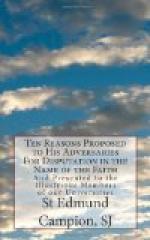a sweat of water and blood, He shuddered under a sense
of eternal damnation, He uttered an irrational cry,
an unspiritual cry, a sudden cry prompted by the force
of His distress, which He quickly checked as not sufficiently
premeditated (Marlorati in Matth. xxvi.; Calvin in
Harm. Evangel.). Is there anything further?
Attend. When Christ Crucified exclaimed, My
God, my God, why hast Thou forsaken me, He was
on fire with the flames of hell, He uttered a cry
of despair, He felt exactly as if nothing were before
Him but to perish in everlasting death (Calvin in
Harm. Evangel.). To this also let them
add something, if they can. Christ, they say,
descended into hell, that is, when dead, He tasted
hell not otherwise than do the damned souls, except
that He was destined to be restored to Himself:
for since by His mere bodily death He would have profited
us nothing, He needed in soul also to struggle with
everlasting death, and in this way to pay the debt
of our crime and our punishment. And lest any
one might haply suspect that this theory had stolen
upon Calvin unawares, the same Calvin calls all
of you who have repelled this doctrine, full as it
is of comfort, God-forsaken boobies (Institut.
ii. 16). Times, times, what a monster you have
reared! That delicate and royal Blood, which
ran in a flood from the lacerated and torn Body of
the innocent Lamb, one little drop of which Blood,
for the dignity of the Victim, might have redeemed
a thousand worlds, availed the human race nothing,
unless the mediator of God and men, the man Christ
Jesus (I Tim. ii. 5) had borne also the second
death (Apoc. xx. 6), the death of the soul, the
death to grace, that accompaniment only of sin and
damnable blasphemy! In comparison with this insanity,
Bucer, impudent fellow that he is, will appear modest,
for he (on Matth. xxvi.), by an explanation very preposterous,
or rather, an inept and stupid tautology, takes hell
in the creed to mean the tomb. Of the Anglican
sectaries, some are wont to adhere to their idol, Calvin,
others to their great master, Bucer; some also murmur
in an undertone against this article, wishing that
it may be quietly removed altogether from the Creed,
that it may give no more trouble. Nay, this was
actually tried in a meeting at London, as I remember
being told by one who was present, Richard Cheyne,
a miserable old man, who was badly mauled by robbers
outside, and, for all that, never entered his father’s
house.[2]
And thus far of Christ. What of Man? The image of God is utterly blotted out in man, not the slightest spark of good is left: his whole nature in all the parts of his soul is so thoroughly overturned that, even after he is born again and sanctified in baptism, there is nothing whatever within him but mere corruption and contagion. What does this lead up to? That they who mean to seize glory by faith alone may wallow in the filth of every turpitude, may accuse nature, despair of virtue, and discharge




